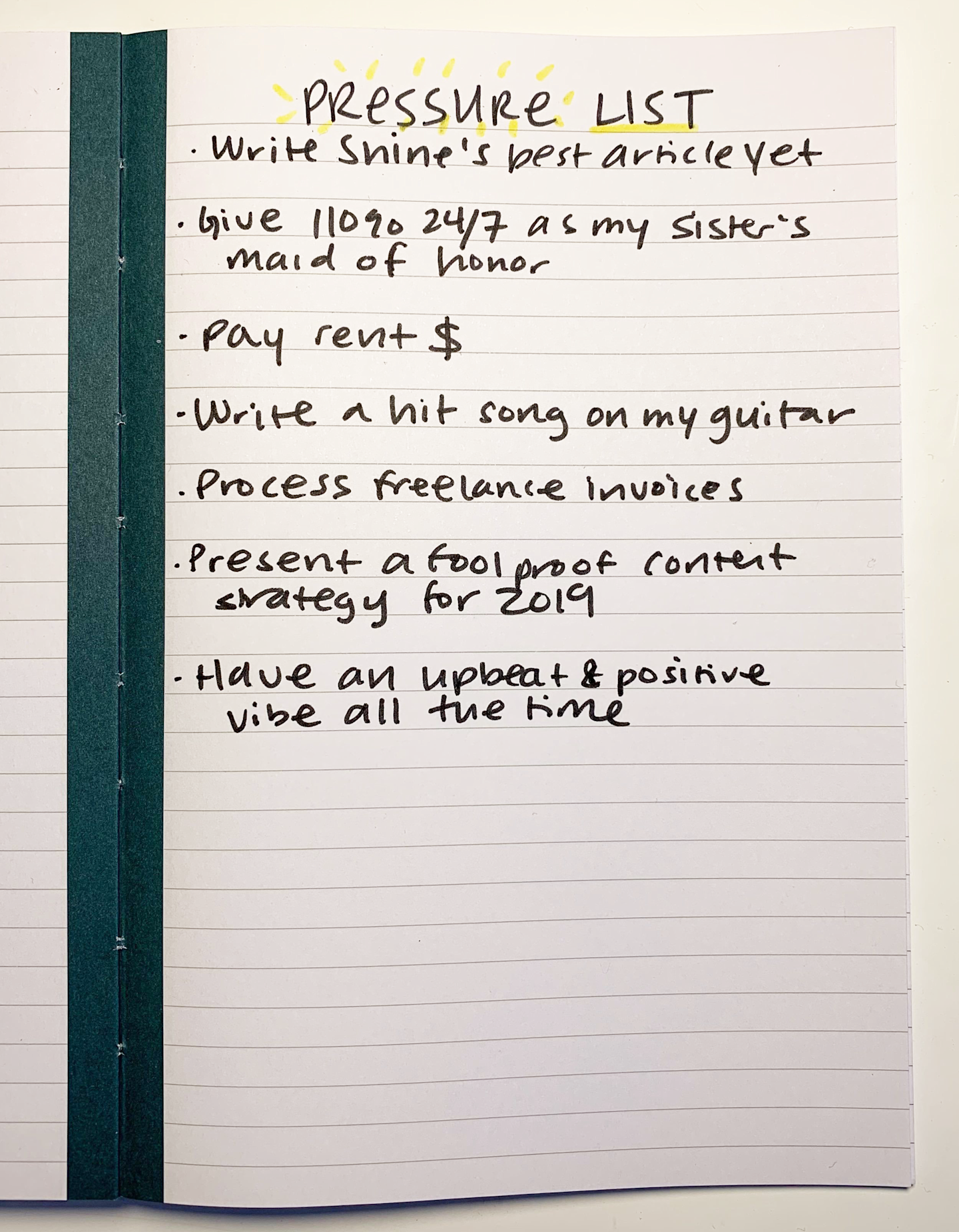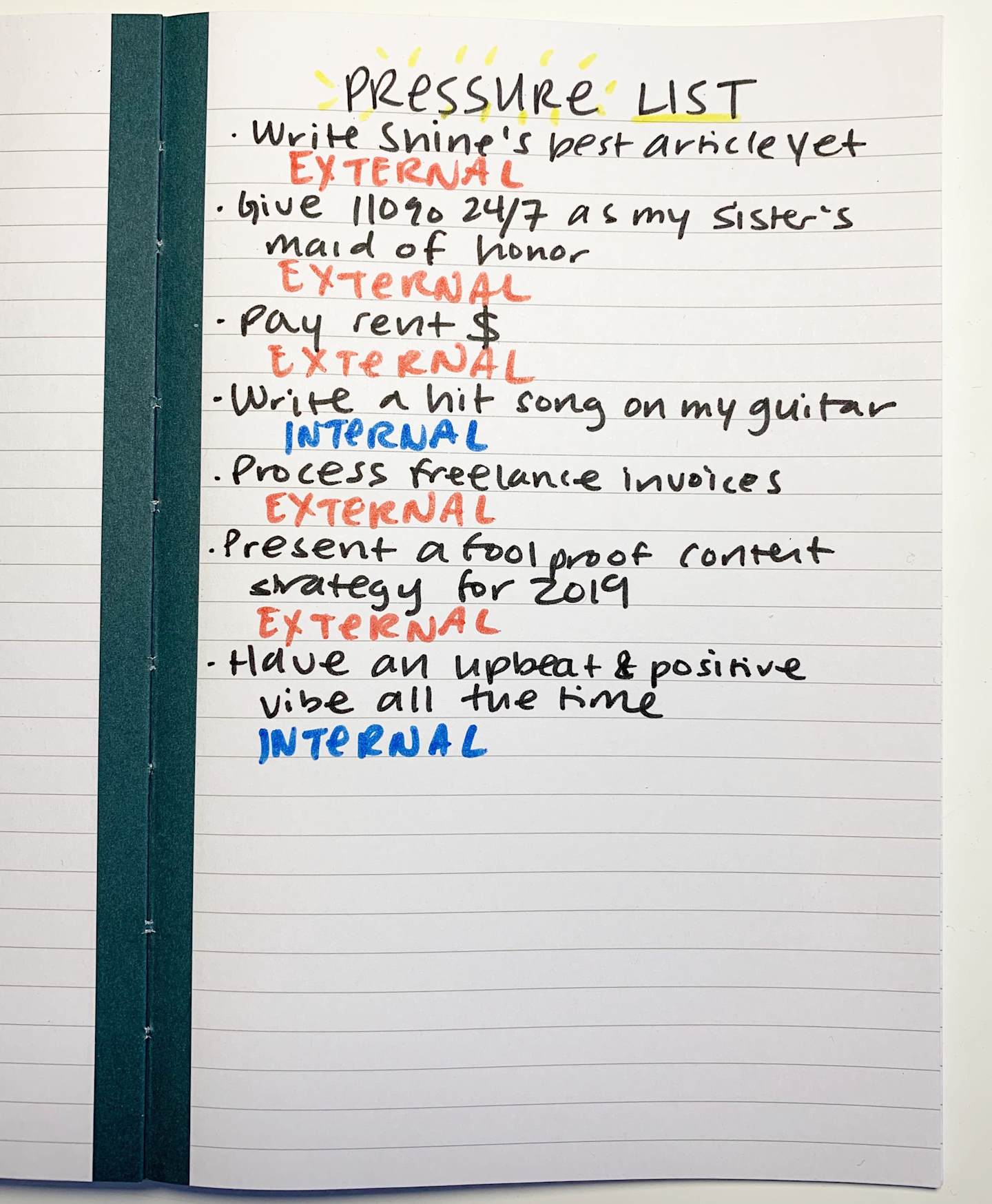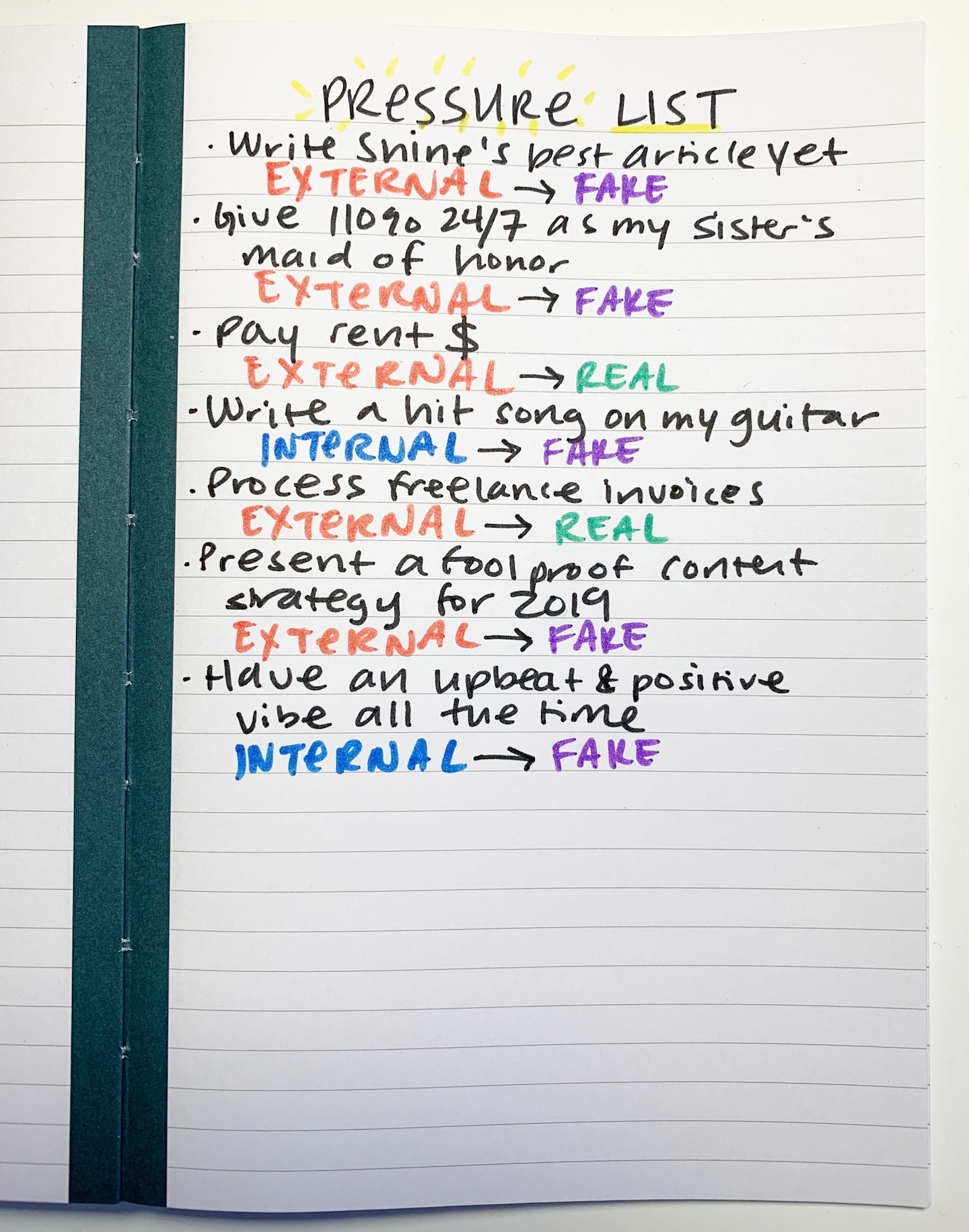How a 'Pressure List' Helps Me Keep My Stress in Check
No time to read? No sweat—listen to this article in the Shine app. Here's a sneak peek:
January 29, 2019
“I just feel like I’m under so much pressure.”
I said those words to my mom during one of our recent weekly phone chats, after I’d ranted for a few minutes about how stressful my day/week/month felt. And, in her motherly wise way, her response was, “Well, where’s the pressure coming from?”
At that moment, I realized: I didn’t really know.
I could say that there was pressure from work, from family, from friends, from the world at large—I could make up some great dramatic similes about how my stress felt “like a backpack full of rocks that keeps getting heavier” or “like those frantic final moments on Chopped when your dish with Sour Patch Kids just isn’t coming together.”
But when asked to pinpoint the exact things that felt stressful, I drew a blank. And not knowing what stressed me out made me feel even less in control. So that evening, I pulled out my journal and did an exercise that actually helped me figure it out.
Under (Two Types of) Pressure
Before we get into the exercise (stick with me—it’s a good one), it’s important to know there are two types of pressure we can feel: external and internal.
External pressures are those that come from the world around us—our partners, our bosses, our email inbox, our family, our pets. It’s those thoughts like “Yikes, I need to respond to that urgent email” or “Shoot, I need to buy that thoughtful gift for the birthday brunch.”
Internal pressures, on the other hand, we create in our own minds and bestow on ourselves like little stressful gifts. “These include all the inner ‘shoulds,’ ‘musts,’ and ‘have-tos,’” Rick Hanson, Ph.D., writes on Psychology Today. "Like: ‘I must not look bad.’ Or: ‘I can't leave the house with dishes in the sink.’”
Internal pressures tend to come from our internal fears, a sense of uncertainty, or our beliefs about how we should exist in the world.
Our brains constantly track these external and internal expectations, rewarding us when we accomplish them and stirring up stress and pressure when we don’t meet the demands we set for ourselves.
Our brains constantly track external and internal expectations, rewarding us when we accomplish them and stirring up stress and pressure when we don’t meet the demands we set for ourselves.
Yes, some of this pressure is beneficial—it can motivate us to tackle our goals and be a supportive partner or friend, Hanson explains. But too much pressure—and unrealistic pressure—can create a cycle of self-shaming that leads to all the stress.
Plus: We’re great at spinning up and tracking pressures that don’t really exist, especially when it comes to internal pressure. “Be aware of the ‘shoulds’ and ‘musts’ muttering—or shouting—in your mind,” Hanson says. “Are they really true?”
Time For a Pressure List
Knowing this, I decided to create what I'm calling a Pressure List to debunk and rationalize some of my pressure.
Why: Research shows that journaling can help us better understand ourselves and process our stress.
When we write things out, our left brain (the more analytical side) and right brain (the more emotional side) are able to work together to help us make better sense of how we feel, according to Psych Central. Also: Even just writing out how you feel is proven to make emotions less intense.
When we write things out, our left brain and right brain are able to work together to help us make better sense of how we feel.
To start, I gave myself a few minutes to list out some of the pressure I felt like I was under—without judgement. Here’s what I found:

Even just writing it out, I started to feel a little bit better—it wasn't all just in my head.
From there, I labeled if the pressure felt external or internal. Some things could easily fall in both buckets, but I tried to pick just one to make the exercise easier (also: I tried to release the pressure to perfectly label everything as I did this).

Next came the fun part: I started to question if the pressure truly was real—or, if it was fake or imagined.
With external pressure, I did this by asking myself: Does someone else really expect this of me? Or, could I be holding myself to a much higher expectation than actually exists?
And when it came to internal pressure, I asked myself: Am I being too hard on myself by expecting this? Could I still be proud if I didn’t meet this expectation?
I went through the items one by one and felt some of the stress start to release as I noticed a trend of fake pressure.

For example: “Write Shine's best article yet.”
Yes, I was on a deadline to write an article for the site. But did my team actually want the best article in the history of the Interwebs? Or, did they just want a solid piece that would resonate with our members?
Next: “Give 110% 24/7 as my sister’s maid of honor.”
Did my sister want me to do an amazing job as her maid of honor? Yes. Did she want it on my mind all hours of the day and night? Probably not.
Some pressure was very real—I did need to process invoices and pay rent. But for some real tasks, I added fake stress by expecting perfection. For example: "Present a foolproof content strategy." The only person in the office who expected perfection was me—so why put that pressure on myself?
For some real tasks, I added fake stress by expecting perfection.
And writing a hit song on my guitar? Creating that pressure was a quick way to kill one of my favorite hobbies.
And then there was the straight-up fake pressure—I’m looking at you, “Have an upbeat & positive vibe all the time.” Sure, that’d be nice, but it’s not realistic to think I can operate on one emotion every single day. I’m not Siri.
When I finished the exercise, I wish I could say that I suddenly felt zero pressure and as free as a woman in a disposable razor commercial, acting as if she’s wearing shorts for the first time in her adult life. But we can’t fully get rid of pressure or stress. What we can do: Get curious about it and lessen the load.
Overall, the exercise helped me start to untangle that elusive ball of stress I felt in the pit of my stomach.
The exercise helped me start to untangle that elusive ball of stress I felt in the pit of my stomach.
Next time you’re feeling under pressure, try a Pressure List and see if it helps you, too.
And if that doesn’t work: At least we all have a theme song to get us through the most pressure-filled days.
Read next: How 'Spacewalking' My To-Do List Helps Me Work Smarter, Not Harder
Shine is supported by members like you. When you buy through links on our site, we may earn an affiliate commission. See our affiliate disclosure for more info.



